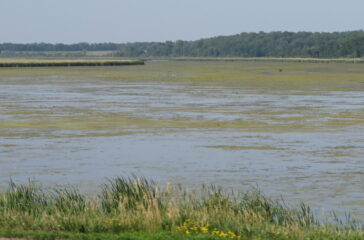Cancer in the corn belt sparks actions to fight farm chemical contamination
By Keith Schneider
When directors of the public water utility in Des Moines, Iowa, went to court in 2015 to try to stop toxic farm nutrients from contaminating the city’s drinking water, they knew the federal lawsuit they filed would be seen as not just a desperate step to protect public health, but also a brazen act of defiance that would provoke a ferocious response from Iowa’s powerful farm and political leadership.
As they anticipated, a cohort of agricultural interests joined then-Gov. Terry Branstad in beating back the lawsuit, which Branstad declared an act of “war on rural Iowa.”
Des Moines Water Works alleged that drainage districts in three Iowa counties had polluted the Raccoon River with nitrates, forcing costly efforts by Des Moines to render the polluted water safe for drinking. A The case was dismissed in 2017 after a court ruled that Iowa law immunizes drainage districts from damage claims.
It was the last time a government entity in Iowa or any other Corn Belt state made a focused attempt to reduce human exposure to suspected cancer-causing commercial fertilizers and a flood of livestock manure that routinely drains from farm fields into groundwater, streams, and rivers.
Until now.
Prompted by compelling research showing that cancer-related diseases and deaths are climbing as contamination from common agricultural chemicals and manure increases in key farm states, lawmakers and health officials in Iowa, Minnesota, and Nebraska are pursuing an array of new strategies aimed at reducing the risks to human health presented by the ongoing farm-related contamination.
A top concern for lawmakers and health professionals in the three states is reducing exposure to nitrates, which form when nitrogen from fertilizer and manure combine with oxygen. Babies can suffer severe health problems when consuming nitrates in drinking water, and a growing body of literature indicates potential associations that include an increased risk of cancer.
“It’s pretty obvious that in the areas where levels of nitrates and other agrichemicals in water are higher, you get more pediatric cancers and birth defects,” said Eleanor Rogan, chair of the Department of Environmental, Agricultural, and Occupational Health at the University of Nebraska Medical Center. “So that sort of tells you maybe you should do something about this and get the levels down.”
 EWG
EWG